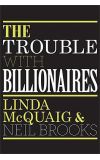
03 Jul 2013 00:48:34
This episode is one of the many entertaining and enraging examples in a new exposé of the super-rich. Linda McQuaig and Neil Brooks focus their ire on income levels and tax. Between 1980 and 2008, during the time of supposed plenty, the income of the bottom 90% of Americans grew by a measly 1%. The income of the top 0.01% grew by 403%.
Their polemic is assiduously researched and a fast-paced read. They leaven graphs and data with amusing quotes from a rogue's gallery of the rich. Lloyd Blankfein, he of Goldman Sachs fame, proclaims he is "doing God's work". This one was my favourite: "There are two things that are important in politics. The first is money, and I can't remember what the second is." The statement comes from Mark Hanna, a Republican of the late 19th century, who bankrolled the presidential campaign of William McKinley.
The period 1940-80 was the most egalitarian era in modern western history. Thanks to progressive taxes, the share of national income in the UK held by the top 1% dropped from 17% on the eve of the second world war to 6% pre-Maggie. This, the authors argue, was an era of more fairness and almost unprecedented prosperity – for the many. This is the nub of their argument – a correlation between high tax levels and better social outcomes.
The book argues passionately against the present austerity of the coalition government. Yet why is there so little public anger on the streets in Britain? The authors ask the question but don't come up with an answer. More worryingly, why do polls suggest greater animosity towards welfare "scroungers" than bankers? Rather than have my preconceptions confirmed, I would appreciate even more a book that deconstructs the obedient relationship the "ordinary" person has towards the oligarchy.

